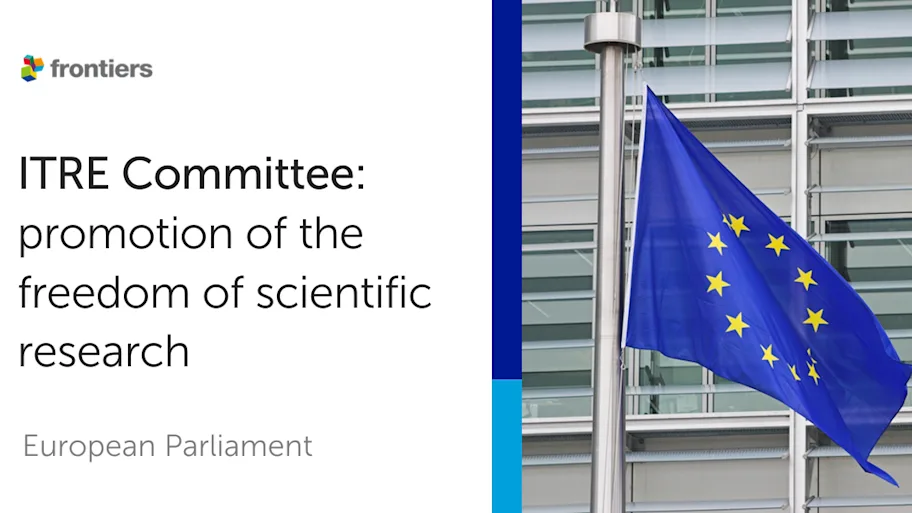
- Science news
- Frontiers news
- To protect academic freedom, we must first define it
To protect academic freedom, we must first define it
In September, the European Parliament Committee on Industry, Research and Energy (ITRE) published a draft report on academic freedom in the European Union. Frontiers welcomed the recommendations put forward. Recently, an amended version of the report was adopted.

The European Parliament Committee on Industry, Research and Energy (ITRE) adopted an amended version of the report on the promotion of the freedom of scientific research in the European Union (EU) on 27 November 2023. Submitted by German rapporteur Christian Ehler, Member of the European Parliament for the European People's Party, the report highlighted the crucial role of safeguarding academic freedom. The compromise amendments, which will be put to a plenary vote tentatively scheduled for 15 January 2024, contain paragraphs with language in support of open science.
1i. Estimates that freedom of scientific research must come with the responsibility to respect highest ethical standards and integrity in scientific research and should foster Open Science. Emphasises that integrity of scientific research requires transparency of funding, and that the freedom of scientific research brings a responsibility towards society to provide this transparency. Strongly supports, therefore, the common practice of transparent communication on sources of funding for research activities and calls on the scientific sector to safeguard this norm;
1k. Insists on the relevance of open knowledge to ensure the freedom of scientific research; calls for efficient and transparent creation of knowledge without artificial barriers hindering the access to information and its dissemination; estimates that sharing results of scientific research for non-commercial purposes must be protected by European law and actively promoted; stresses that publicly funded scientific results shall be published in open-access academic journals and the results shall be accessible for everyone in an easily accessible way;
Frontiers is a passionate advocate for fully open science to facilitate collaboration among scientists and accelerate innovation for society's benefit. As an open access publisher, we welcome the adoption of the amended report. By making scientific results, methods, and data publicly available, it is possible to increase the quality, speed, impact, and reproducibility of research. Furthermore, open science fosters a culture of openness, diversity, and innovation in the scientific community, empowering researchers to address the global challenges of our time. Academic freedom is strengthened by open science as it offers researchers the opportunity to publish their results without fear of censorship, discrimination, or other interference. We are hopeful for a positive outcome from the plenary vote, one in favor of open science and academic freedom.
Following the report's adoption, the European Parliament's Panel for the Future of Science and Technology (STOA) held a high-level conference on academic freedom, “Academic Freedom – The state of a fundamental value for Europe,” which was initiated and hosted by Christian Ehler. The underlying theme of the conference centered on the acknowledgement that academic freedom should never be taken for granted. It serves as a persistent battleground, influenced by various political and societal interests, with violations and infringements on academic freedom existing today across the European Union. As a key participant in this discourse, the European Union plays a crucial role in creating a framework that not only safeguards academic freedom, but actively promotes it.
Sabine Döring, State Secretary of the Federal Ministry of Education and Research, Germany, offered an initial clarification by distinguishing ‘academic freedom’ from ‘freedom of expression’ – two fundamental concepts outlined in the Bonn Declaration. As she explained, freedom of expression relies on the principle of “epistemic openness,” while academic freedom is grounded in the principle of “epistemic quality.” Academic freedom, unlike freedom of expression, adheres to clearly defined academic standards which do not allow for “random interpretation” as it is founded in evidence-based truth and thus, does not allow for “academic cherry picking.”
In attendance at the conference was Anke Beck, head of public affairs and advocacy for Europe at Frontiers, who commented: “There is an urgent need to clearly consider academic freedom in all aspects. Only by doing so can we effectively address and navigate the complexities associated with safeguarding this fundamental value. Through our mission to make science fully open, Frontiers protects and promotes epistemic quality, that is not more and not less the standard of rigor, soundness, and reliability of the knowledge and information presented and communicated within scholarly contexts. It involves adhering to methodological and evidential standards, critically evaluating sources, and maintaining intellectual integrity to ensure the credibility and validity of academic discussions. Science thrives when it is free from political and financial constraints. This is why it is essential to secure the unrestricted sharing of and access to scientific knowledge. We encourage others to do the same and welcome opportunities for dialogue around academic freedom and epistemic quality, and how to best champion it.”
About Frontiers
Frontiers is the 3rd most-cited scientific publisher on relative citation scores. We publish discoveries by the world’s top researchers. Scientists empower society and our mission is to accelerate scientific discovery by making science open. We place the researcher at the center of everything we do and enable the research community to develop the solutions we need to live healthy lives on a healthy planet. Featuring state of the art custom-built publishing technology, artificial intelligence, and rigorous quality standards, our research articles have been viewed more than 2.4 billion times, reflecting the power of research when it is open for all to read.




